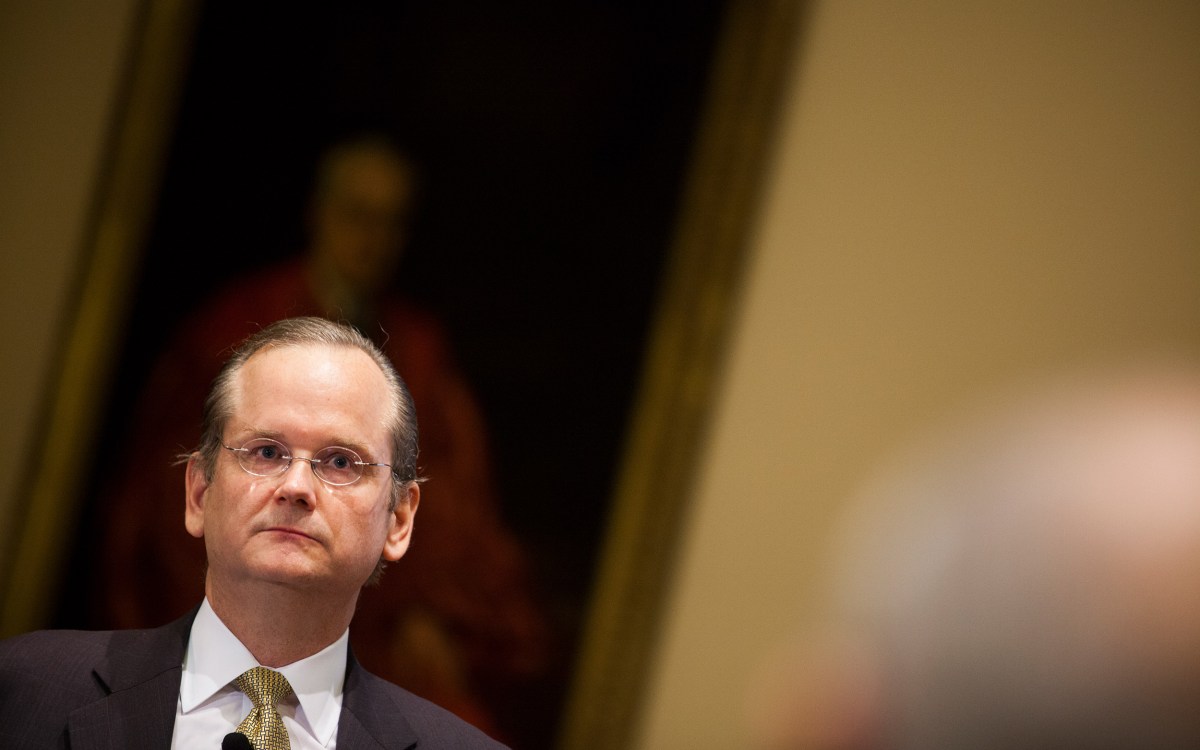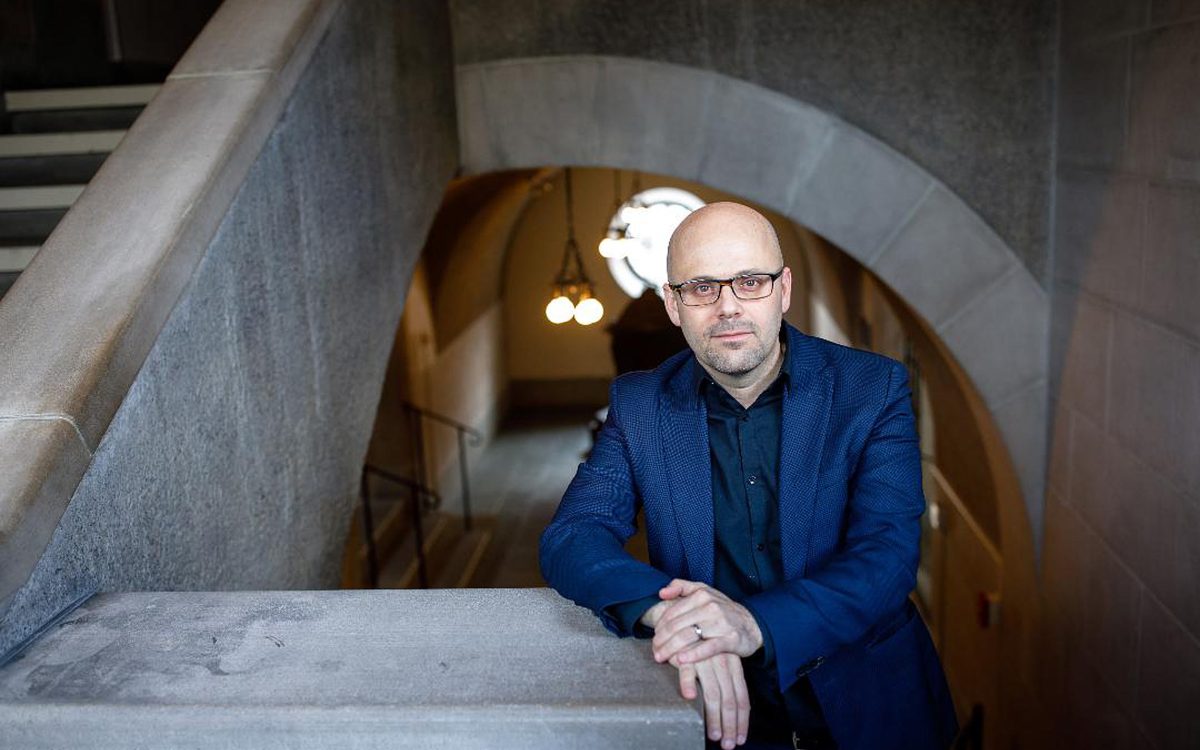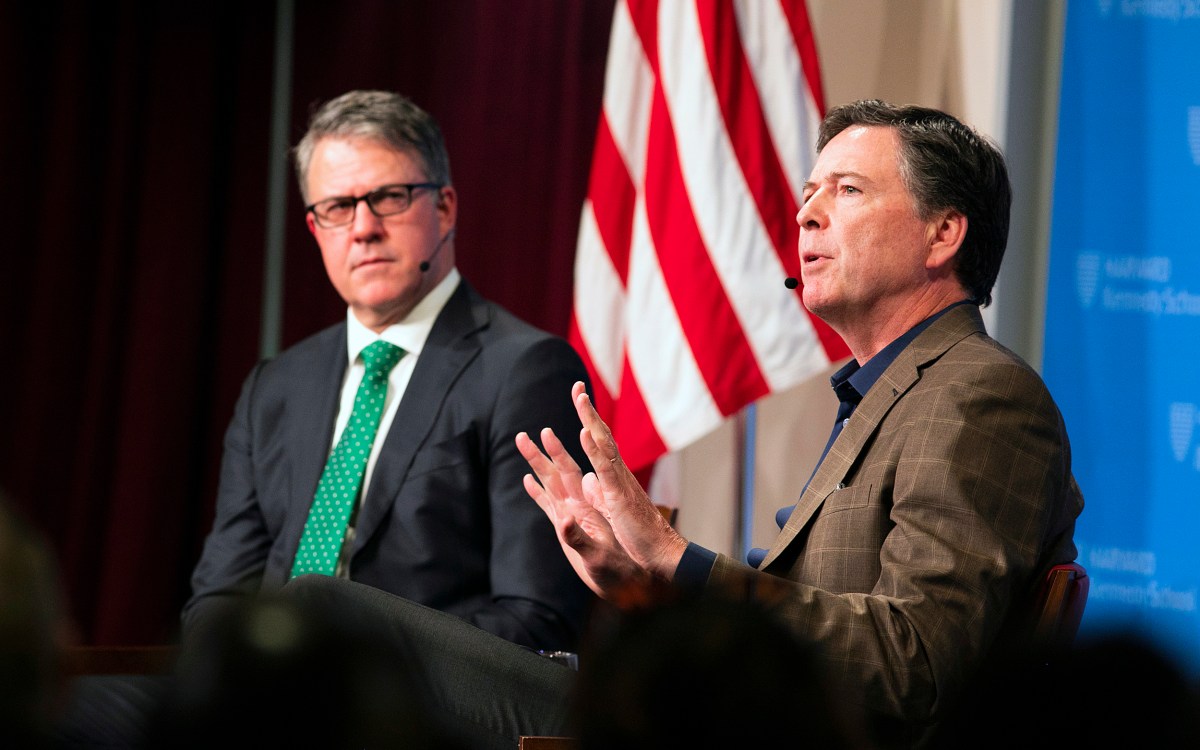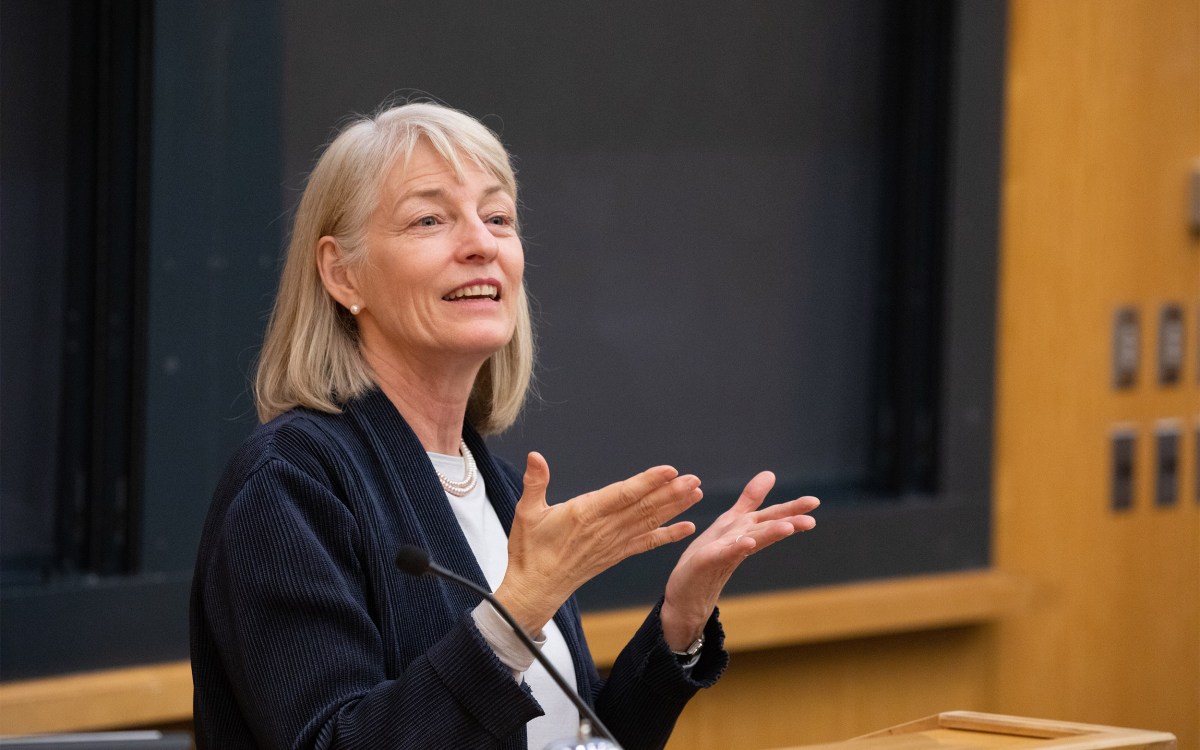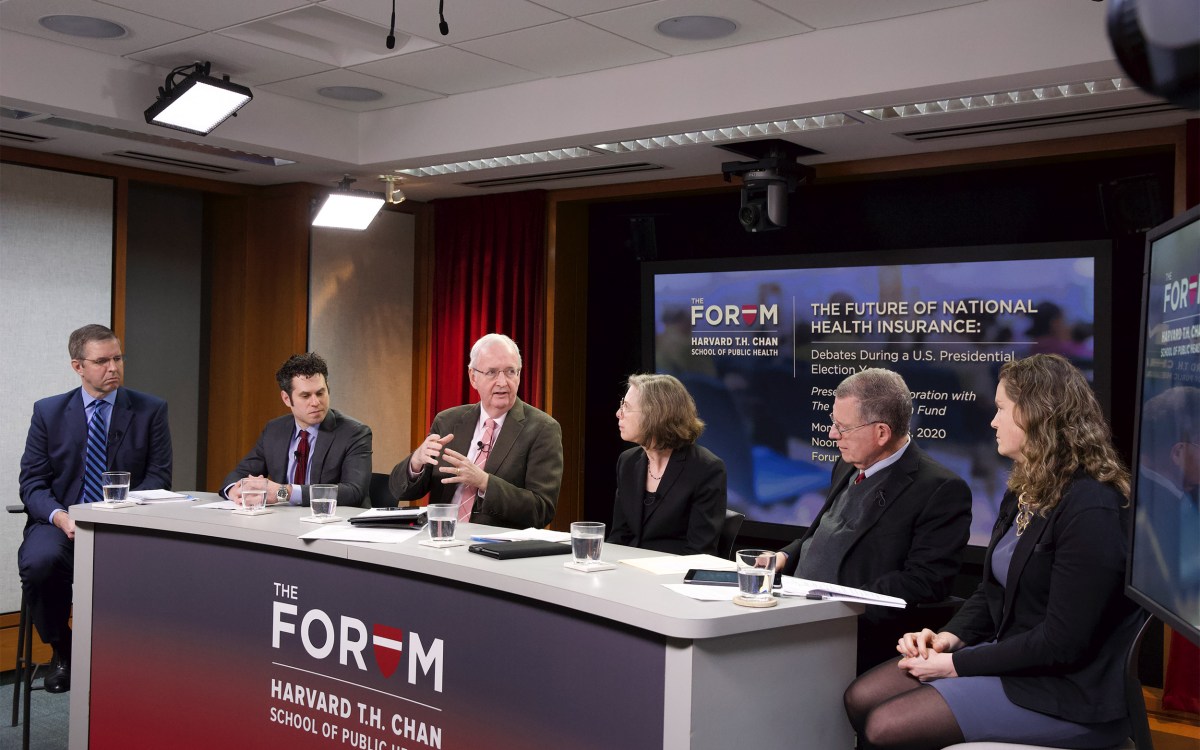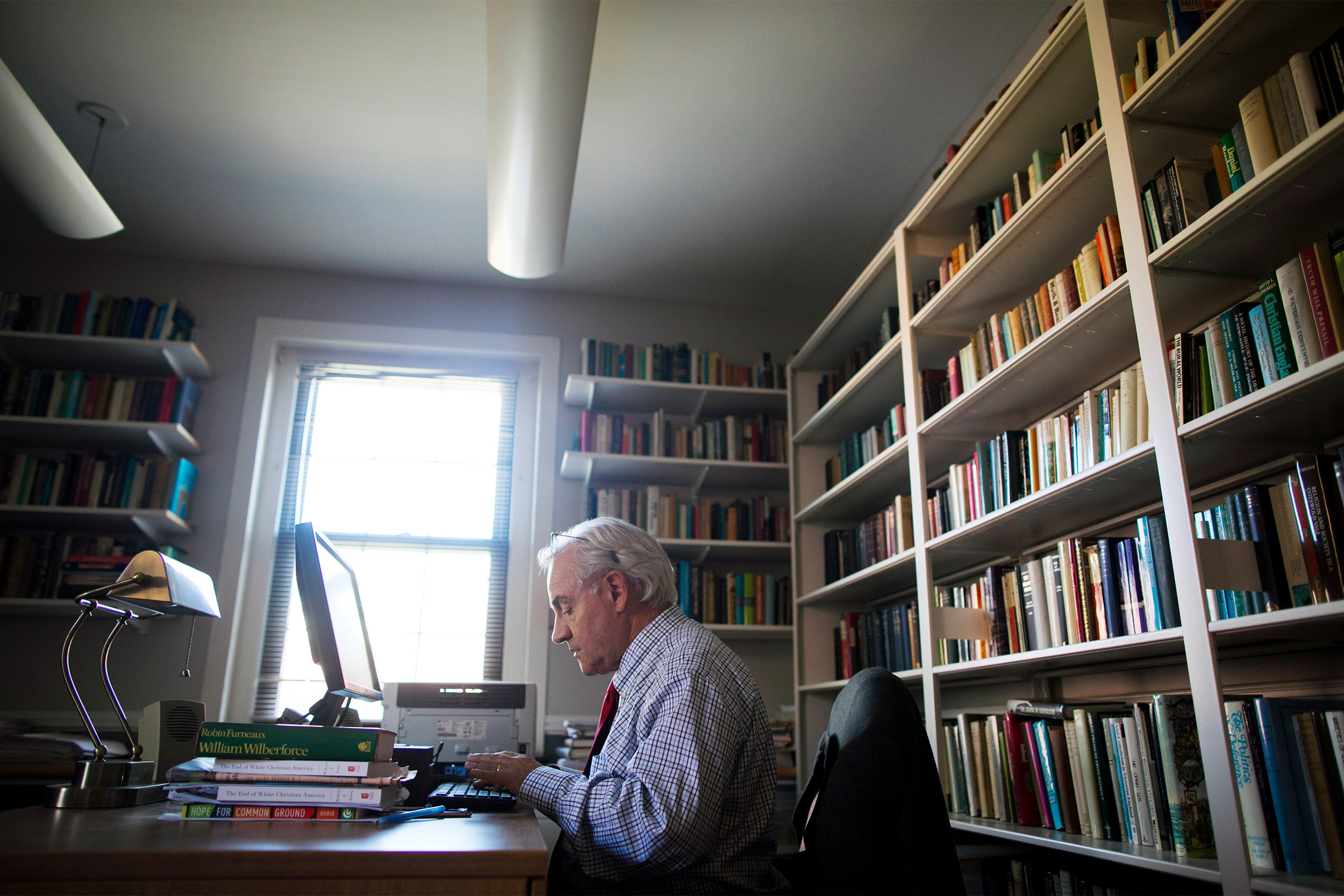
Stephanie Mitchell/Harvard file photo
‘Will progressives and moderates feud while America burns?’
Washington Post columnist E.J. Dionne outlines a path forward in his new book ‘Code Red’
In his latest book, “Code Red: How Progressive and Moderates Can Unite to Save our Country,” Washington Post columnist E.J. Dionne ’73 argues that progressives and moderates can unite on an agenda that that emphasizes unity, dignity, and empathy, as they grapple with the tensions between big, swift reforms and gradual change. In his book, Dionne writes he is asking them to “put aside their differences not just for one election, but for the larger purpose of moving the country forward.” The Gazette spoke with Dionne, a visiting professor in religion and political culture at Harvard Divinity School, about what he sees on the political horizon.
Q&A
E.J. Dionne
GAZETTE: Why did you write this book?
DIONNE: I wrote this book not simply because Donald Trump is a president I sharply disagree with, not simply a president who says awful things and treats other people, particularly vulnerable people, badly. I wrote it because I truly believe that Trump may well represent, especially if reelected, a threat to basic democratic values and even to the rule of law itself. And I think the intervention last month by Attorney General [William] Barr in the Roger Stone case, followed by the resignation of lawyers on the case in protest of Barr’s decision, reflected a politicization of justice that is one of those first steps down the road toward authoritarianism.
GAZETTE: How far down the road are we?
DIONNE: We’re not there yet, thank God. We still have free speech. We still have free elections. And I’m not a catastrophist. I don’t like crying wolf. But I think this moment is genuinely different. And since Watergate, there’s been a great deal of forbearance on the part of presidents in intervention in the Justice Department. Forbearance, by the way, is a word that two Harvard professors, Daniel Ziblatt and Steven Levitsky, point to as an important democratic virtue in their great, great book “How Democracies Die.” People have to exercise forbearance in their use of power. When they don’t, it becomes very dangerous, and so this I found chilling. But I also wrote the book because I see many reasons for hope. As Theda Skocpol, another great Harvard colleague, has pointed out from her research, opposition to Trump has drawn tens of thousands of Americans, particularly women and young people, to political action, often for the first time. They have gathered in libraries, diners, and church basements to share wisdom, organize and, in many cases, run for office themselves. So if Trump poses a threat to democracy, the broad and principled opposition he has called forth could strengthen democracy — especially if progressives and moderates learn to work together and appreciate what they can learn from each other.
GAZETTE: Why the name “Code Red?”
DIONNE: I spent a lot of time with my editors discussing the title, and we kept coming back to the sense of emergency the country faces. As we were talking someone just said “Code Red” — I think I was the one, but I don’t claim to remember for certain — and it just seemed like the right title for a book whose first sentence is: “Will progressives and moderates feud while America burns?”
GAZETTE: Where do you see the political center today?
DIONNE: I emphatically argue in the book that the center cannot be defined as the midpoint between where the Republican Party is and where the Democratic Party is, because the Republicans have veered much further to the right than Democrats moved to the left. If you just look at who makes up the two parties, the Republican Party is overwhelmingly conservative, whereas the Democratic Party is split roughly evenly between liberals on the one side and moderates and even a fair number of Democrats who still call themselves conservative.
GAZETTE: Then what do those in the center want?
DIONNE: I think the center of the country believes in government action to solve problems, but is somewhat skeptical of government. I think Obamacare is the best example of where the center is today. There was a lot of skepticism when it was first passed. And now a substantial majority of the country supports Obamacare, now that it’s clear that it expands access to coverage, protects those with preexisting conditions, and lets young people stay on their parents’ health plans until age 26. Americans understand that there are a lot of people who need government help to buy health insurance. And a majority also understands that virtually every rich country in the world has some form of universal coverage, not necessarily single payer, but some form of government guarantee that people can either get health insurance through the government or buy it at an affordable price with subsidies. The center still expects government to help solve problems facing the country. It isn’t happy with growing economic inequality. People are looking for respect at work; they’re looking for decent compensation for their work; they’re looking for work organized in a way that allows them to be good parents and live decent family lives. So I see the broad center as moderately progressive, and there’s a lot of polling that shows that to be the case.
GAZETTE: In your book you talk about dignity as a core purpose for progressive politics today. Can you say more?
DIONNE: If we think of where discontent exists in the country right now, a lot of that discontent is rooted in a sense of dignity denied. This is true of an African American in the inner city who feels that he or she is treated with disrespect because of their race, and also of a worker, whether white, black, or Latino, who once made a decent living through a blue-collar job but now finds it very difficult to get a job that offers the compensation they need and feel they have a right to. There are so many areas in which people feel a denial of dignity. I push two issues in my book: dignity and empathy. The country is crying out for a notion of the equal dignity of every person, which probably is something that is always in the recesses of my mind from Catholic social thought. They also want a degree of empathy, in which both political leaders and the people next door can have some sense of where you are standing, what another person might be going through. I thought it significant that Amy Klobuchar got a powerful response when she closed her New Hampshire primary campaign with the story about the man crying when Roosevelt’s funeral train went by. A reporter asked the man, “Did you know the president?” And he said, “No, but the president knew me.” It’s one of the great stories of American politics. I think that speaks to a sense that all citizens want to be understood, want to be seen as endowed with dignity. And it’s also true that dignity is not a word you would naturally associate with the Trump presidency.
GAZETTE: You also discuss the concept of “visionary gradualism.” What is it and how can it be a path forward?
DIONNE: It’s a term used by the late Michael Harrington — his book “The Other America” helped spark the War on Poverty — that powerfully captures a core argument of my book: that people who call themselves moderate and people who call themselves progressive have more in common than they sometimes want to realize. I argue that they have things to learn from each other. What moderates can learn from progressives is it that progressives are often right, that there are certain problems that require what Elizabeth Warren likes to call “big structural change,” and that we should not shy away from the need for fundamental reform. What moderates are often right about is that, over our history, we have often enacted these reforms in steps and that we have not done everything at once. You have to bring people along, persuade people to take the path you’re on. You often have to take a first step by way of proving that your ideas work, so people will be willing to agree to the second and third steps.
“We still have free speech. We still have free elections. And I’m not a catastrophist. I don’t like crying wolf. But I think this moment is genuinely different.”
GAZETTE: Can you give us some examples?
DIONNE: The two examples I use are Social Security and Civil Rights. The original Social Security Program was not nearly as all-encompassing as it became, but it was big enough to lay down a marker, and the country said, “Yes, we really want to guarantee old-age pensions to everybody.” It was later expanded into the program we know today. Similarly, Congress passed two relatively weak Civil Rights bills in the 1950s that helped pave the way for the great Civil Rights Act of 1964 and the Voting Rights Act of 1965. That’s where visionary gradualism comes in. The “visionary” part speaks to the progressives’ commitment to thoroughgoing reform. The gradualism part speaks to the moderate sense of how reform often comes in stages.
GAZETTE: Some think Sen. Bernie Sanders won’t be able to beat Trump if he becomes the nominee because of his Socialist platform. What do you think?
DIONNE: We forget that we actually did have a very vibrant Socialist movement in our country at the turn of the [last] century. When Eugene Debs ran for president on the Socialist ticket in 1912, he got 6 percent of the vote nationwide and, as I note in the book, Socialists held more than 1,200 offices in 340 American cities, their ranks including 79 mayors. So, socialism is not outside the American tradition. Secondly, I think younger people are more attracted to socialism than older people are because they have a different notion of what socialism is. Some colleagues and I worked on a survey in 2018. We gave people two choices for what is socialism. One definition was essentially Sweden, Denmark, Norway, Finland, where the government guarantees access to health care, college, and so on. The other was the old Soviet system of government control of the economy. We found that 58 percent of American ages 18‒29 chose the first option. Young people are much more likely to see socialism as Denmark or Sweden, which are rather nice places, while older people are likely to see it as representing the repressive Soviet Union. And that’s really what the divide in the country is. The Socialist label would be problematic for older voters far more than for younger voters. Younger people, it should be said, also experienced the Great Recession, capitalism’s greatest crisis since the Depression, as they entered the workforce. This, too, affects their attitudes.
GAZETTE: Do you think supporters of certain candidates will stay home during the general election instead of vote for someone they don’t like? For example, some have suggested Bernie supporters won’t vote for someone other than him in the general election.
DIONNE: Another reason I wrote the book is to say to folks like that that if Bernie doesn’t prevail in the primary, they need to stay engaged. Because when the progressive movement was at its best historically, its left wing was successful both in giving critical support to somewhat more moderate progressives and in pushing them in a more progressive direction. The example I use is the old Congress of Industrial Organizations, the labor federation that mushroomed during FDR’s presidency. Sidney Hillman, the CIO’s political genius, led a movement that brought pressure on Roosevelt even as it supported him against his enemies on the right. The CIO’s members didn’t stay home; they turned out for Roosevelt. But once Roosevelt was elected, they pushed as hard as they could to make Roosevelt more progressive and to prevent backsliding. So, what I’m arguing for is that the broad progressive center and the left need to have a more functional relationship with each other.
GAZETTE: So you’re saying the key involves a kind of active give and take?
DIONNE: The energy that exists in the progressive part of this movement needs to be respected by the moderates, but the left needs to accept that in many parts of the country only more moderate candidates will prevail. I write in the book about two new members of Congress elected in 2018. Ayanna Pressley won her primary in the Boston area over Congressman Mike Capuano (who was actually quite progressive himself) with a coalition of African Americans and younger people. That fall, another new member of Congress, Abigail Spanberger from Virginia, won a seat that had been a Tea Party seat. Her campaign and her constituency were very different from Pressley’s. But Pressley wouldn’t have the influence in Congress she has within a Democratic majority if candidates such as Spanberger hadn’t prevailed in more conservative districts. Spanberger, in turn, needed the energy provided by progressive activists who flocked to her campaign. Pressley and Spanberger are good examples of the kinds of people who need to come together in our politics if we’re going to move forward. And I wrote the book because I think it’s important that they come together in 2020, and beyond.



